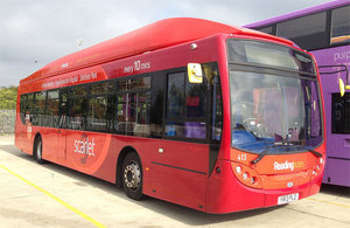Fitting older bus engines with environmental filters is a better use of taxpayers’ money than a diesel car scrappage scheme, according to a new report.
Campaign group Greener Journeys said that although diesel cars are the biggest producers of roadside air pollution, fitting air filters to older buses is the easiest and most cost-effective way to tackle ‘the public health emergency that the UK is facing’.

Progress in diesel bus technology exceeded diesel car technology
The report, Improving Air Quality In Towns And Cities, says that if the Government is serious about tackling air quality in towns and cities across the UK, it ‘must put the bus at the centre of its strategy’.
Report author, David Begg, visiting professor at Plymouth University, said: ‘The most effective way to reduce air pollution is not to replace older diesel cars with newer models – it is to reduce the number of cars on the road and invest in clean public transport which can dramatically cut the level of emissions per passenger.
‘Policy must be based on hard evidence rather than political expediency. Any Government money that is available for scrappage schemes should be directed to buses first.’
The report argues that progress in clean diesel bus technology ‘has dramatically exceeded diesel car technology’.
It calculates that bus retrofitting would cost £12 per kilogram of Nitrogen Oxides (Nox) saved – 15 times less than a diesel scrappage scheme, which could cost £175 for every kilogram saved.
Similarly, a bus scrappage scheme to replace older diesel buses with the latest clean models would cost £16 per kilogram of NOx saved – providing 11 times better value than a diesel car scrappage scheme.
The report also calls for Government to include private diesel cars in the five new clean air zones, that are required to be implemented in Birmingham, Leeds, Nottingham, Derby and Southampton by 2020.
Register now for full access
Register just once to get unrestricted, real-time coverage of the issues and challenges facing UK transport and highways engineers.
Full website content includes the latest news, exclusive commentary from leading industry figures and detailed topical analysis of the highways, transportation, environment and place-shaping sectors.
Use the link below to register your details for full, free access.
Already a registered? Login